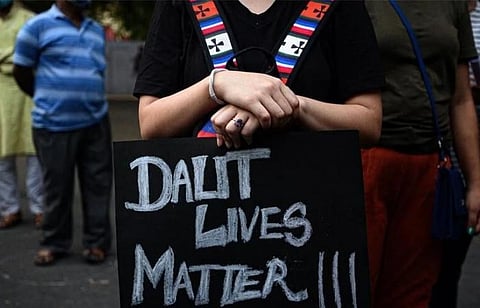
Ontario- The problem of caste is not confined to India or the Indian Subcontinent. The proliferation of the Indian diaspora beyond the country has sustained the culture of caste beyond borders. The fight against caste-based discrimination has extended beyond national boundaries. However, in recent years, the battle against caste has gained momentum abroad as the Bahujan diaspora from India has waged a struggle across continents.
In a recent victory in the fight against caste, the Ontario Human Rights Commission has added caste to its policy statement. The statement asserts that caste is now covered under the Human Rights Code.
"The OHRC takes the position that caste-based discrimination is an intersectional system of discrimination that can be covered under any combination of ancestry, creed, colour, race, ethnic origin, place of origin, family status, or possibly other grounds under Ontario’s Code." The Code prohibits discrimination in services, housing accommodation, employment, vocational associations, and contracts," reads the statement by Ontario HRC.
The statement also cites a UN report stating that "discrimination based on caste and similar systems of inherited status is a global problem."
Ontario is the first province in Canada to recognize caste, making it the inaugural province in North America to do so. Canada has a significant population of Indian diaspora, with a majority concentrated in Ontario and the British Columbia province of the country. The Indian community also includes a notable number of Dalits, the lower castes—victims of caste prejudice by the upper castes considered higher in the caste hierarchy.
The Mooknayak spoke to Vijay Puli, Founder and Executive Director of SADAN (South Asian Dalit Adivasi Network), to understand the significance of the updated framework of the Ontario Human Rights Commission. Puli, who resides in Toronto, stated, "It is a landmark development in the fight against caste as it provides a clear definition and mandates institutions across Ontario to adopt policies against caste-based discrimination. So far, there has been confusion regarding caste as a form of discrimination, but the official definition provided in the document will eliminate this confusion." He also acknowledged the contributions of the Ambedkar International Mission, Toronto, and Ambedkarite International Coordination Society, Canada, in this campaign.
Puli mentioned several cases in Canada where individuals from lower castes have faced discrimination: denial of housing rentals upon revealing their lower caste status, bullying of Dalit children, use of casteist slurs at community events, and the association of beef-eating with Dalit people, among other instances.
This major development follows a trend that began in March this year when the Toronto School Board, the largest school board in Canada, recognized caste as a form of discrimination in schools. This decision followed complaints of bullying and widespread use of caste slurs in schools. Notably, it was the Toronto School Board that recommended the Ontario Human Rights Commission to create a framework on caste-based discrimination. In April, the Burnaby City Council added caste as a protected category.
In March, the British Columbia Human Rights Tribunal fined two individuals for using derogatory terms for a member of a "lower caste" during an assault. The state of British Columbia also marked April 14th, the birth anniversary of Baba Saheb Bhim Rao Ambedkar, as "B.R. Ambedkar Equality Day."
Chinnaiah Jangam, co-founder of SADAN, speaking to The Mooknayak, said, "It is a significant milestone in the direction of the anti-caste struggle and caste equity. We have been advocating for this for the last three years. The Commission had consultations with SADAN and other stakeholders. SADAN presented evidence of caste practices in Canada, and finally, the Ontario Human Rights Commission recognized caste. This decision brings relief to the diaspora community after the setback in the state of California, United States."
Jangam mentioned that similar to California, caste-Hindu lobbies were active in Canada, but the Canadian situation is more democratic. Given that it's a human rights issue, the framework took their grievances into consideration.
Also Read-
You can also join our WhatsApp group to get premium and selected news of The Mooknayak on WhatsApp. Click here to join the WhatsApp group.